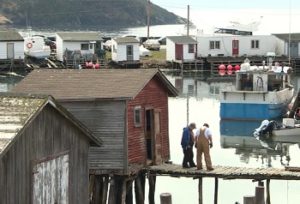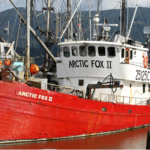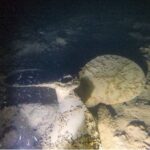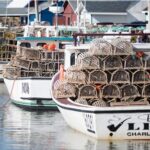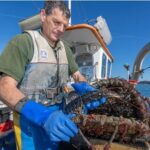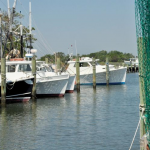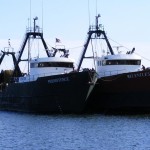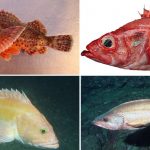Monthly Archives: May 2016
Profile: Joseph Branin – From Selling Bait to Managing the Belford Seafood Co-Op — A Fish Story
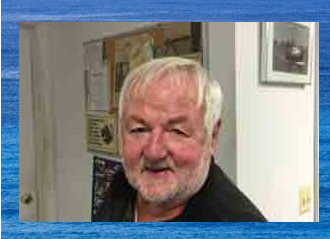 Who: Joseph Branin Age: 69 Family: Married, two daughters, one son Home: Highlands What he does: General manager of Belford Seafood Co-op for nearly 20 years. How many fishermen in the co-op: There are 18 to 20 boats active in the Belford fishing fleet, and some 50 families make their living there. How does the co-op work: Fishermen bring in their haul, and the fish are then sent to a market, and the fishermen are paid according to the price the fish is selling for that day. “It all sells. You just never know what price you’re going to get for it. If there’s a lot of that species in the market, you’re going to get a lowball price. If it’s something less plentiful, you’ll get a good price,” Branin says. How he got there: Branin started selling bait and gas at a dock in the Highlands when he was 12 years old. Read the rest here 14:06
Who: Joseph Branin Age: 69 Family: Married, two daughters, one son Home: Highlands What he does: General manager of Belford Seafood Co-op for nearly 20 years. How many fishermen in the co-op: There are 18 to 20 boats active in the Belford fishing fleet, and some 50 families make their living there. How does the co-op work: Fishermen bring in their haul, and the fish are then sent to a market, and the fishermen are paid according to the price the fish is selling for that day. “It all sells. You just never know what price you’re going to get for it. If there’s a lot of that species in the market, you’re going to get a lowball price. If it’s something less plentiful, you’ll get a good price,” Branin says. How he got there: Branin started selling bait and gas at a dock in the Highlands when he was 12 years old. Read the rest here 14:06
Changing Migration Patterns Upend East Coast Fishing Industry
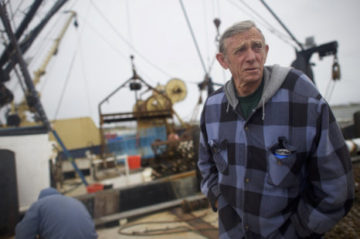 Summer flounder that once amassed in North Carolina have gradually shifted about 140 miles to New Jersey—one facet of the northward migration of fish species that is upending traditional fishing patterns. The move north has sparked debate among regulators over how to respond to changing natural resources that could affect commercial fisheries across the eastern seaboard. For the first time, a group of researchers backed by the federal government is trying to ascertain what the northward movement means for fishermen’s income and way of life. “Some fisherman will end up losing out and some will win big,” Read the rest here 13:04
Summer flounder that once amassed in North Carolina have gradually shifted about 140 miles to New Jersey—one facet of the northward migration of fish species that is upending traditional fishing patterns. The move north has sparked debate among regulators over how to respond to changing natural resources that could affect commercial fisheries across the eastern seaboard. For the first time, a group of researchers backed by the federal government is trying to ascertain what the northward movement means for fishermen’s income and way of life. “Some fisherman will end up losing out and some will win big,” Read the rest here 13:04
Athearn Marine Agency Boat of the Week: 44′ 11″ Offshore Lobster-Gillnetter Cat 3408TA
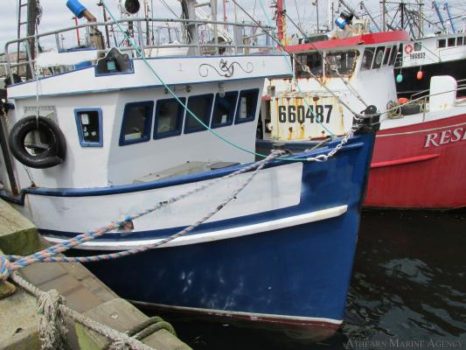 Specifications, information and 50 photos click here To see all the boats in this series, Click here 12:39
Specifications, information and 50 photos click here To see all the boats in this series, Click here 12:39
Always Top Quality! Your Seafreeze Ltd. Preferred Price List for May 11th 2016 Has Arrived!
Contact our sales team today @ 401 295 2585 or 800 732 273 Click here for the complete price list from Seafreeze Ltd. We are Direct to the Source-We are Fishermen-We are Seafreeze Ltd! Visit our website! 12:00
Protection and Indemnity Insurance: Without insurance, skippers can be on the hook for medical bills
 When a fisherman falls sick or injured during the season, who pays the medical bills – the crewman or the skipper? That was the topic covered by Dillingham attorney Jürgen Jensen at a recent Business of Fish session at the Bristol Bay Campus. Boat captains can sometimes be on the hook for “maintenance and cure,” which Jensen explains is similar to workers’ compensation. “Injuries are pretty obvious: somebody’s gonna get hurt. If you lose a finger, obviously that’s an injury that could happen on the boat,” said Jensen. “But this can also come up with illnesses. If somebody falls ill with cancer and they’re on your boat fishing, the court will say that you owe maintenance and cure. You will owe for medical bills while they’re getting cured of cancer, and you’ll owe the daily maintenance rate, which generally ranges between $35 and $55 dollars a day.” There are some exceptions; Read the rest here 10:37
When a fisherman falls sick or injured during the season, who pays the medical bills – the crewman or the skipper? That was the topic covered by Dillingham attorney Jürgen Jensen at a recent Business of Fish session at the Bristol Bay Campus. Boat captains can sometimes be on the hook for “maintenance and cure,” which Jensen explains is similar to workers’ compensation. “Injuries are pretty obvious: somebody’s gonna get hurt. If you lose a finger, obviously that’s an injury that could happen on the boat,” said Jensen. “But this can also come up with illnesses. If somebody falls ill with cancer and they’re on your boat fishing, the court will say that you owe maintenance and cure. You will owe for medical bills while they’re getting cured of cancer, and you’ll owe the daily maintenance rate, which generally ranges between $35 and $55 dollars a day.” There are some exceptions; Read the rest here 10:37
Saving Phyllis A hits a snag – $200K in state aid never came; fundraising off track
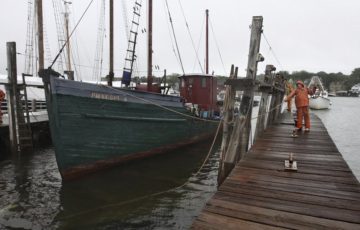 The Phyllis A is looking a little dispirited these days, ensconced in the shadows thrown by the cluster of boats in the storage lot of Gloucester Marine Railways on Rocky Neck. The 91-year-old gillnetter, the oldest former commercial fishing boat in a place where that should mean something, sits under a tarp on the railway’s ubiquitous boat stands, its hull a warren of good wood and bad. On the pavement next to it, the old boat’s pilot house, removed to allow access to on-deck work areas, rests like a tiny sidekick. “She’s drying out,” said Douglass Parsons, the longtime foreman at the railways. “We should have had her back in the water last month. The longer she stays here, the more work that will have to be done.” Read the story here 09:48
The Phyllis A is looking a little dispirited these days, ensconced in the shadows thrown by the cluster of boats in the storage lot of Gloucester Marine Railways on Rocky Neck. The 91-year-old gillnetter, the oldest former commercial fishing boat in a place where that should mean something, sits under a tarp on the railway’s ubiquitous boat stands, its hull a warren of good wood and bad. On the pavement next to it, the old boat’s pilot house, removed to allow access to on-deck work areas, rests like a tiny sidekick. “She’s drying out,” said Douglass Parsons, the longtime foreman at the railways. “We should have had her back in the water last month. The longer she stays here, the more work that will have to be done.” Read the story here 09:48
Busted! 20 kilos of cocaine discovered stashed inside of frozen fish.
 The fish tale began May 4 when U.S. Customs and Border Protection officers seized an air cargo shipment of “large, frozen fish” from Suriname at Miami International Airport, according to U.S. Homeland Security special agent Ryan Varrone. Agents filleted the fish and removed the cocaine, which has a street value of about $600,000, according to authorities.The fish was replaced in the shipping boxes and transported by truck to a storage facility in Queens which was kept under surveillance, Varrone’s complaint states. Daniels, 32, and Gonsalves, 33, showed up at the warehouse on Friday in a white van. They picked up the boxes and drove to another storage facility in Brooklyn where they were arrested,,, Read the rest here 09:29
The fish tale began May 4 when U.S. Customs and Border Protection officers seized an air cargo shipment of “large, frozen fish” from Suriname at Miami International Airport, according to U.S. Homeland Security special agent Ryan Varrone. Agents filleted the fish and removed the cocaine, which has a street value of about $600,000, according to authorities.The fish was replaced in the shipping boxes and transported by truck to a storage facility in Queens which was kept under surveillance, Varrone’s complaint states. Daniels, 32, and Gonsalves, 33, showed up at the warehouse on Friday in a white van. They picked up the boxes and drove to another storage facility in Brooklyn where they were arrested,,, Read the rest here 09:29
Lobstermen Justin and Travis Maderia plan to sue Stonington officials over fire that sank their boat
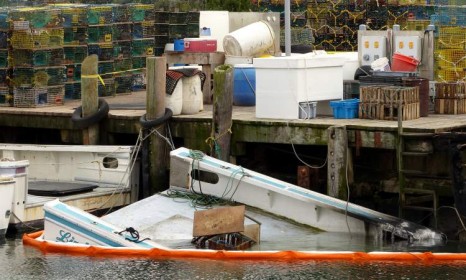 Two brothers whose lobster boat was destroyed by fire at the Town Dock last November have informed the town they intend to sue a long list of municipal employees and officials because of the damage to their business. These include damages to business equipment and personal property, lost business opportunities and personal damages. Mystic attorney Michael Hardesty, who represents well-known local lobstermen Justin and Travis Maderia and their business Lindy Inc., served the town with the notice on Tuesday. The 43-foot Lindy Inc. burned and sank at the Town Dock during the early morning hours of Nov. 11, 2015, and was raised a few days later. The fire, which also damaged another boat tied to the Lindy, as well as some of the dock’s pilings and decking, remains under investigation by police and the state fire marshal. Read the story here 22:05
Two brothers whose lobster boat was destroyed by fire at the Town Dock last November have informed the town they intend to sue a long list of municipal employees and officials because of the damage to their business. These include damages to business equipment and personal property, lost business opportunities and personal damages. Mystic attorney Michael Hardesty, who represents well-known local lobstermen Justin and Travis Maderia and their business Lindy Inc., served the town with the notice on Tuesday. The 43-foot Lindy Inc. burned and sank at the Town Dock during the early morning hours of Nov. 11, 2015, and was raised a few days later. The fire, which also damaged another boat tied to the Lindy, as well as some of the dock’s pilings and decking, remains under investigation by police and the state fire marshal. Read the story here 22:05
Lobster fisherman wary of Gulf of St. Lawrence oil drilling
 As lobster season gets underway Tuesday in Cape Breton, a top local fisherman is warning that oil exploration and drilling in the Gulf of St. Lawrence could wreak havoc on local marine life. “It could ruin our industry,” said Jordan MacDougall, president of the Inverness South Fisherman’s Association. He warned that any oil spill would settle on the seabed — prime lobster habitat — and devastate their populations. “You wouldn’t be able to sell your product and it would probably give Canada a negative name for that product from other areas,” said MacDougall. His comments come just four months after regulators granted a one-year extension on an oil exploration licence for Corridor Resources Inc. at the Old Harry site off the western coast of Newfoundland, in the Gulf of Saint Lawrence. Read the story here 18:19
As lobster season gets underway Tuesday in Cape Breton, a top local fisherman is warning that oil exploration and drilling in the Gulf of St. Lawrence could wreak havoc on local marine life. “It could ruin our industry,” said Jordan MacDougall, president of the Inverness South Fisherman’s Association. He warned that any oil spill would settle on the seabed — prime lobster habitat — and devastate their populations. “You wouldn’t be able to sell your product and it would probably give Canada a negative name for that product from other areas,” said MacDougall. His comments come just four months after regulators granted a one-year extension on an oil exploration licence for Corridor Resources Inc. at the Old Harry site off the western coast of Newfoundland, in the Gulf of Saint Lawrence. Read the story here 18:19
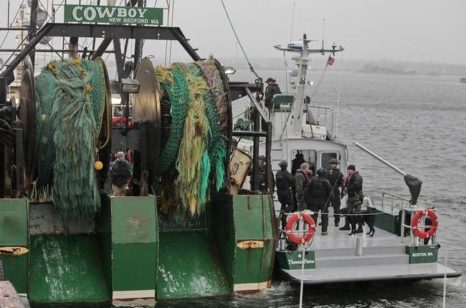
Prosecutors – Carlos Seafood’s transaction reports didn’t match up
The FV Hera II, a boat that prosecutors said fishing fleet owner Carlos Rafael owned through a shell corporation, reported catching 4,595 pounds of haddock on Jan. 25, then selling it to Rafael’s Carlos Seafood business, a registered dealer, according to the indictment of Rafael that was unsealed Monday. Carlos Seafood also recorded acquiring 840 pounds of American plaice, or “dabs,” from the Hera II that day, prosecutors said. But here’s the rub: Records of Carlos Seafood’s third-party sales Jan. 25, according to the indictment, cite about 200 pounds of haddock and 5,200 pounds of dabs. In other words, prosecutors allege, a lot of the fish caught by the Hera II on Jan. 25 and reported as “haddock” actually were dabs, which are subject to stricter regulatory quotas. Read the rest here 17:37
The Enviro Crackpots keep pushing! – Cashes Ledge deserves permanent protection
 World famous oceanographer Sylvia Earle dived Cashes Ledge and declared it to be a “Yellowstone” of the ocean. Visions of enviro’s appear in my head doing the wave chanting ocean Serengeti over and over, trance like,,, Despite all the fishing that has rendered much of the Northeast a shell of its colonial riches, there remains in precious spots underwater life every bit the rival of the California coast and the Caribbean. Two such areas, Cashes Ledge and the
World famous oceanographer Sylvia Earle dived Cashes Ledge and declared it to be a “Yellowstone” of the ocean. Visions of enviro’s appear in my head doing the wave chanting ocean Serengeti over and over, trance like,,, Despite all the fishing that has rendered much of the Northeast a shell of its colonial riches, there remains in precious spots underwater life every bit the rival of the California coast and the Caribbean. Two such areas, Cashes Ledge and the New England Mid Atlantic Coral Canyons and Seamounts, deserve national marine monument status from President Obama before he leaves office. But there aren’t any such protections in the Atlantic, and groups such as the Conservation Law Foundation, the National Geographic Society, the Pew Charitable Trusts, and the National Resources Defense Council, are campaigning for protection. (Full disclosure: I (Derrick Jackson) coauthored a book on Maine’s puffin restoration and discussed the bird’s winter feeding at a CLF luncheon this winter). Get the gist? Read the rest here 16:58
Cooke Aquaculture of Canada will purchase Icicle Seafoods
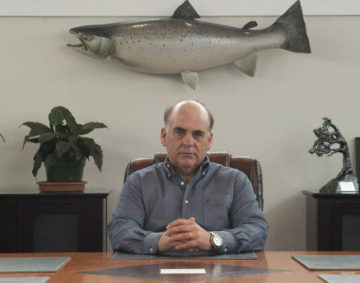 Cooke Aquaculture, a Canadian fisheries firm based in New Brunswick, said May 9 that the company has signed a definitive agreement to purchase Icicle Seafoods. The transaction is anticipated to close in less than 30 days once all regulatory and legal matters have been completed, the company said. Financial terms of the agreement were not disclosed. Icicle, which began as Petersburg Fisheries Inc. in Southeast Alaska in 1965, is currently owned by the private equity firm Paine & Partners, with headquarters in Foster City, CA. With the acquisition, the Cooke group of companies will produce over 275,000 metric tons of seafood annually and generate $1.8 billion in annual sales, Cooke said. Glenn Cooke, president of Cooke Seafood, described the deal as “an exciting venture for us as it will add a well-respected fishery to our family businesses. Read the rest here 12:15
Cooke Aquaculture, a Canadian fisheries firm based in New Brunswick, said May 9 that the company has signed a definitive agreement to purchase Icicle Seafoods. The transaction is anticipated to close in less than 30 days once all regulatory and legal matters have been completed, the company said. Financial terms of the agreement were not disclosed. Icicle, which began as Petersburg Fisheries Inc. in Southeast Alaska in 1965, is currently owned by the private equity firm Paine & Partners, with headquarters in Foster City, CA. With the acquisition, the Cooke group of companies will produce over 275,000 metric tons of seafood annually and generate $1.8 billion in annual sales, Cooke said. Glenn Cooke, president of Cooke Seafood, described the deal as “an exciting venture for us as it will add a well-respected fishery to our family businesses. Read the rest here 12:15
Encouraging results from fishing trials with new trawl design for reducing unwanted catches
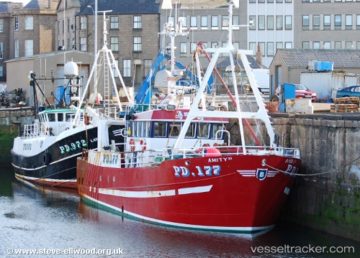 Preliminary fishing trials using a new design of prawn trawl developed to reduce unwanted bycatches of fish have produced encouraging results. The prototype trawl, which is the brainchild of fishing skipper Jimmy Buchan and netmaker Mark Buchan of Jackson Trawls, is designed to aid North Sea prawn fishermen comply with new Landing Obligation regulations (discard ban). Working in a project supported by The Gear Innovation Technology and Advisory Group (GITAG), initial fishing trials with the new trawl on the fishing vessel Amity II resulted in a significant drop in the amount of unwanted whitefish retained without any reduction in the prawn (langoustine) catch. Furthermore, the quality of the prawns was noticeably better compared with those caught in traditional trawls. Read the story here 11:34
Preliminary fishing trials using a new design of prawn trawl developed to reduce unwanted bycatches of fish have produced encouraging results. The prototype trawl, which is the brainchild of fishing skipper Jimmy Buchan and netmaker Mark Buchan of Jackson Trawls, is designed to aid North Sea prawn fishermen comply with new Landing Obligation regulations (discard ban). Working in a project supported by The Gear Innovation Technology and Advisory Group (GITAG), initial fishing trials with the new trawl on the fishing vessel Amity II resulted in a significant drop in the amount of unwanted whitefish retained without any reduction in the prawn (langoustine) catch. Furthermore, the quality of the prawns was noticeably better compared with those caught in traditional trawls. Read the story here 11:34
VIMS earns $6M in set-aside funding for scallop research
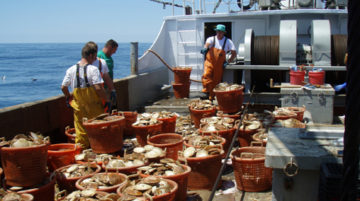 Researchers at William & Mary’s Virginia Institute of Marine Science have earned nearly $6 million in set-aside funding to advance the understanding and management of sea scallops off the U.S. East Coast. These tasty bivalves support one of the nation’s highest-valued commercial fisheries. Announced by NOAA’s Northeast Fisheries Science Center and the New England Fishery Management Council, the awards to VIMS account for six of the 15 research projects funded. Senior Research Scientist David Rudders is lead investigator on five of the six VIMS projects and a co-lead on the other one. Support for the projects comes from the 2016 Sea Scallop Research Set-Aside (RSA) program, Read the rest here 10:06
Researchers at William & Mary’s Virginia Institute of Marine Science have earned nearly $6 million in set-aside funding to advance the understanding and management of sea scallops off the U.S. East Coast. These tasty bivalves support one of the nation’s highest-valued commercial fisheries. Announced by NOAA’s Northeast Fisheries Science Center and the New England Fishery Management Council, the awards to VIMS account for six of the 15 research projects funded. Senior Research Scientist David Rudders is lead investigator on five of the six VIMS projects and a co-lead on the other one. Support for the projects comes from the 2016 Sea Scallop Research Set-Aside (RSA) program, Read the rest here 10:06
John Oliver trashes bad science and worse media coverage of it
 Comedian John Oliver has done it again. His hour-long, commercial-free “Last Week Tonight” on HBO gives him the flexibility to present long-form pieces (and curse to his heart’s content), and that’s just what he did Sunday in a 19-minute segment on misleading scientific studies. “There is a lot of bullshit currently masquerading as science,” Oliver said. The news coverage of such studies may even be worse. “A new study showing that drinking a glass of red wine is just as good as spending an hour at the gym,” proclaimed one TV news teaser he showed. “That last one doesn’t even sound like science. It’s more like something your sassy aunt would wear on a t-shirt,” Oliver quipped. Watch the video here! 09:38
Comedian John Oliver has done it again. His hour-long, commercial-free “Last Week Tonight” on HBO gives him the flexibility to present long-form pieces (and curse to his heart’s content), and that’s just what he did Sunday in a 19-minute segment on misleading scientific studies. “There is a lot of bullshit currently masquerading as science,” Oliver said. The news coverage of such studies may even be worse. “A new study showing that drinking a glass of red wine is just as good as spending an hour at the gym,” proclaimed one TV news teaser he showed. “That last one doesn’t even sound like science. It’s more like something your sassy aunt would wear on a t-shirt,” Oliver quipped. Watch the video here! 09:38
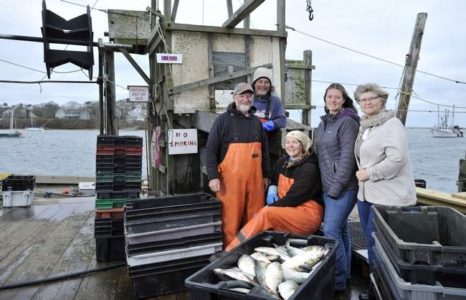
Working Waterfront – Chatham voters back purchase of historic pier
Living in a community nearly surrounded by water, it was perhaps natural voters at town meeting on Monday night approved the $1.5 million purchase of a historic private pier and fish house. Although the decision was primarily intended to guarantee access for the on the Nantucket Sound-side of town, plans are underway to look at how the use of the town pier next door and a pier owned by the Chatham Yacht Club could be coordinated to help improve access for all boaters. The Eldredges, who have a long history as a fishing family and have owned the pier on Stage Harbor for more than 60 years, approached the town about buying it because the family wanted to preserve access for fishermen to offloading facilities and felt selling to the town was the best way to do so. Read the rest here 08:25
Monroe County Sheriff’s Office dive team searches for gun used in alleged Commercial/Rec shooting incident
 Members of the Monroe County Sheriff’s Office dive team are assisting the Coast Guard in its investigation into what transpired last week when a mariner reported a commercial fisherman shot at him and his vessel. Coast Guard Investigative Service Resident Agent in Charge Paul Shultz and Sheriff’s Office spokeswoman Becky Herrin confirmed Monday the Sheriff’s Office is assisting CGIS in the ongoing investigation, the details of which remain murky. There was an allegation made that the gun used in the alleged incident, a rifle, was thrown overboard by the commercial fisherman and the divers are trying to find the rifle regarding that part of the investigation, Shultz said. Read the rest here 07:30
Members of the Monroe County Sheriff’s Office dive team are assisting the Coast Guard in its investigation into what transpired last week when a mariner reported a commercial fisherman shot at him and his vessel. Coast Guard Investigative Service Resident Agent in Charge Paul Shultz and Sheriff’s Office spokeswoman Becky Herrin confirmed Monday the Sheriff’s Office is assisting CGIS in the ongoing investigation, the details of which remain murky. There was an allegation made that the gun used in the alleged incident, a rifle, was thrown overboard by the commercial fisherman and the divers are trying to find the rifle regarding that part of the investigation, Shultz said. Read the rest here 07:30
“It came as a complete shock,” – Sheriff’s deputy charged with smuggling money in ‘Codfather’ case
 A Bristol County sheriff’s deputy was arrested Monday and charged with smuggling thousands of dollars to Portugal for a New Bedford fishing mogul who was allegedly trying to hide his profits from illegal fish sales. Federal officials allege that Antonio M. Freitas, who was also a member of a Homeland Security task force, used his security clearance at Logan International Airport to sneak cash overseas. On Feb. 5, for instance, Freitas and his fiancee allegedly carried $17,500 in cash-filled bags past airport security and boarded a flight to Portugal. After he arrived, he allegedly deposited the money into a bank account owned by Carlos Rafael,,, Bristol County Sheriff Thomas Hodgson called the indictment a “huge, huge disappointment” and said he would place Freitas on unpaid leave from his $57,000-a-year job. Read the rest here 07:09
A Bristol County sheriff’s deputy was arrested Monday and charged with smuggling thousands of dollars to Portugal for a New Bedford fishing mogul who was allegedly trying to hide his profits from illegal fish sales. Federal officials allege that Antonio M. Freitas, who was also a member of a Homeland Security task force, used his security clearance at Logan International Airport to sneak cash overseas. On Feb. 5, for instance, Freitas and his fiancee allegedly carried $17,500 in cash-filled bags past airport security and boarded a flight to Portugal. After he arrived, he allegedly deposited the money into a bank account owned by Carlos Rafael,,, Bristol County Sheriff Thomas Hodgson called the indictment a “huge, huge disappointment” and said he would place Freitas on unpaid leave from his $57,000-a-year job. Read the rest here 07:09
Owner of Commercial Fishing Business and Local Sherrif’s Deputy Indicted in Scheme to Falsify Fishing Records
 BOSTON – The owner of one of the largest commercial fishing businesses in the United States and a Bristol County Sheriff’s Deputy were charged in connection with a long-running scheme involving submitting falsified records to the federal government to evade federal fishing quotas and then smuggling the profits to Portugal. The federal indictment charging the two men was unsealed today after the arrest of the Sheriff’s Deputy. Carlos Rafael, 64, of Dartmouth, the owner of Carlos Seafood, Inc., was indicted on one count of conspiring to falsify reports submitted to the federal government, 25 counts of submitting falsified records and one count of bulk cash smuggling. Rafael was previously arrested on a criminal complaint filed in February 2016. Antonio Freitas, 46, of Taunton, a Sheriff’s Deputy with the Bristol County Sheriff’s Office, was indicted on one count of bulk cash smuggling and one count of structuring the export of U.S. currency. Freitas was arrested this morning and will appear today in U.S. District Court in Worcester. The charges arose out of an undercover investigation in which federal agents posed as organized crime figures interested in buying Carlos Seaford. Read the rest here 18:09
BOSTON – The owner of one of the largest commercial fishing businesses in the United States and a Bristol County Sheriff’s Deputy were charged in connection with a long-running scheme involving submitting falsified records to the federal government to evade federal fishing quotas and then smuggling the profits to Portugal. The federal indictment charging the two men was unsealed today after the arrest of the Sheriff’s Deputy. Carlos Rafael, 64, of Dartmouth, the owner of Carlos Seafood, Inc., was indicted on one count of conspiring to falsify reports submitted to the federal government, 25 counts of submitting falsified records and one count of bulk cash smuggling. Rafael was previously arrested on a criminal complaint filed in February 2016. Antonio Freitas, 46, of Taunton, a Sheriff’s Deputy with the Bristol County Sheriff’s Office, was indicted on one count of bulk cash smuggling and one count of structuring the export of U.S. currency. Freitas was arrested this morning and will appear today in U.S. District Court in Worcester. The charges arose out of an undercover investigation in which federal agents posed as organized crime figures interested in buying Carlos Seaford. Read the rest here 18:09
California Marine Life Protection Act: The ultimate bait and switch
 There is no question that the passage of the Marine Life Protection Act (MLPA) has been the most controversial environmental issue California’s angling community has ever faced. It signaled the state’s shift from a shared philosophy of conserving California’s natural resources to outright protectionism, with little regard to the interests of outdoor recreation, tourism and all of their economic benefits. As the MLPA established the framework for Marine Protected Areas (MPAs), the state promised California anglers that areas designated as off-limits to commercial and recreational fishing may one day be open to fishing. In fact, they were very specific in their promises. Scientific assessments would be conducted every five years, and as fish populations were assessed as sustainably viable, the restrictions would be lifted. (But would they be?) Read the rest here 16:56
There is no question that the passage of the Marine Life Protection Act (MLPA) has been the most controversial environmental issue California’s angling community has ever faced. It signaled the state’s shift from a shared philosophy of conserving California’s natural resources to outright protectionism, with little regard to the interests of outdoor recreation, tourism and all of their economic benefits. As the MLPA established the framework for Marine Protected Areas (MPAs), the state promised California anglers that areas designated as off-limits to commercial and recreational fishing may one day be open to fishing. In fact, they were very specific in their promises. Scientific assessments would be conducted every five years, and as fish populations were assessed as sustainably viable, the restrictions would be lifted. (But would they be?) Read the rest here 16:56
The ‘Codfather’ Carlos Rafael indicted on 27 counts for lying about fish catches and smuggling cash
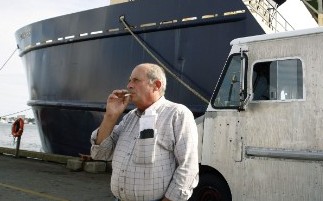 Local fishing magnate Carlos Rafael has been indicted by federal prosecutors for lying about fish catches and smuggling cash to Portugal through Logan airport in Boston, in a multi-year scheme involving hundreds of thousands of dollars, according to records filed last week and unsealed Monday. The indictment lists 27 counts against Rafael, for charges including conspiracy, false entries and bulk cash smuggling. Rafael is alleged to have falsely reported the species of more than 815,000 pounds of fish to the National Oceanic and Atmospheric Administration (NOAA) between 2012 and January of this year, according to the Office of U.S. Attorney Carmen Ortiz. Bristol County Sheriff’s Office deputy Antonio M. Freitas, a Taunton resident, also is named in the indictment. Freitas is charged with two counts, one for bulk cash smuggling and one for international structuring. “Freitas assisted Rafael with smuggling cash through the airport,” the U.S. Attorney’s documents state, referring to Logan International. Read the rest here 13:43
Local fishing magnate Carlos Rafael has been indicted by federal prosecutors for lying about fish catches and smuggling cash to Portugal through Logan airport in Boston, in a multi-year scheme involving hundreds of thousands of dollars, according to records filed last week and unsealed Monday. The indictment lists 27 counts against Rafael, for charges including conspiracy, false entries and bulk cash smuggling. Rafael is alleged to have falsely reported the species of more than 815,000 pounds of fish to the National Oceanic and Atmospheric Administration (NOAA) between 2012 and January of this year, according to the Office of U.S. Attorney Carmen Ortiz. Bristol County Sheriff’s Office deputy Antonio M. Freitas, a Taunton resident, also is named in the indictment. Freitas is charged with two counts, one for bulk cash smuggling and one for international structuring. “Freitas assisted Rafael with smuggling cash through the airport,” the U.S. Attorney’s documents state, referring to Logan International. Read the rest here 13:43
Long Island lobstermen oppose closures, question how regulators are making their decisions.
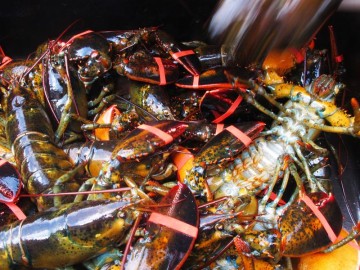 Long Island lobstermen, already straining under the weight of a seasonal closure of the Long Island Sound and sharply reduced lobster populations, face the potential for more closures as federal regulators work to rebuild a depleted stock. At a meeting of the Atlantic States Marine Fisheries Commission last week, the American Lobster Management Board agreed to review a series of new measures to address what they called the continuing decline in the Southern New England lobster fishery, which includes the . The fishery has been affected by environmental factors and fishing activity, the board said. Montauk lobsterman Al Schaffer said he and others saw a resurgence in the areas they fish around the Long Island Sound last year, though fishing is down thus far this spring. “There’s zero science,” he said, adding he strongly opposes any attempt to further restrict fishing. Read the story here 11:10
Long Island lobstermen, already straining under the weight of a seasonal closure of the Long Island Sound and sharply reduced lobster populations, face the potential for more closures as federal regulators work to rebuild a depleted stock. At a meeting of the Atlantic States Marine Fisheries Commission last week, the American Lobster Management Board agreed to review a series of new measures to address what they called the continuing decline in the Southern New England lobster fishery, which includes the . The fishery has been affected by environmental factors and fishing activity, the board said. Montauk lobsterman Al Schaffer said he and others saw a resurgence in the areas they fish around the Long Island Sound last year, though fishing is down thus far this spring. “There’s zero science,” he said, adding he strongly opposes any attempt to further restrict fishing. Read the story here 11:10
The countdown is on for fresh Copper River salmon.
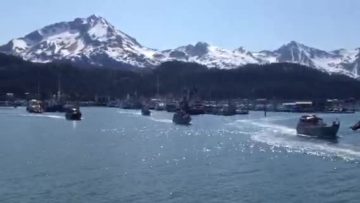 The Alaska Department of Fish and Game has announced the first opening of the Copper River salmon fishing season. The opener is scheduled for 12 hours beginning at 7:00 am and closing at 7:00 pm on Monday, May 16, 2016. As with all Alaska fisheries, the name of the game is sustainability. Fishery managers must be confident that the run is on track to meet escapement goals (the number of salmon that must make it to the spawning grounds to ensure long-term health of the run) before they provide fishing opportunity. Commercial salmon fishermen have fished Copper River salmon for well over a century, which provides fishery managers a wealth of historical data. Throughout the years, an opening date near May 15 has provided for sustainable yield. Read the rest here 10:00
The Alaska Department of Fish and Game has announced the first opening of the Copper River salmon fishing season. The opener is scheduled for 12 hours beginning at 7:00 am and closing at 7:00 pm on Monday, May 16, 2016. As with all Alaska fisheries, the name of the game is sustainability. Fishery managers must be confident that the run is on track to meet escapement goals (the number of salmon that must make it to the spawning grounds to ensure long-term health of the run) before they provide fishing opportunity. Commercial salmon fishermen have fished Copper River salmon for well over a century, which provides fishery managers a wealth of historical data. Throughout the years, an opening date near May 15 has provided for sustainable yield. Read the rest here 10:00
Former fishermen sue Japanese Government for hiding Bikini atoll H-bomb fallout records
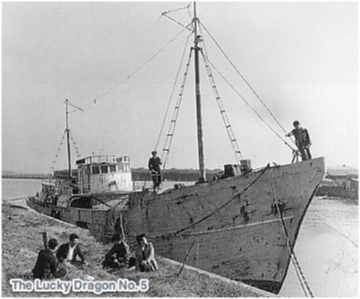 A group of former fishermen Monday filed an unprecedented lawsuit seeking compensation from the government for failing to disclose, for decades, records of their exposure to radiation from U.S. hydrogen bomb tests in the Pacific Ocean in 1954. A total of 45 people, mostly from Kochi Prefecture and including families of deceased fishermen, are seeking ¥2 million each, according to the lawsuit filed at the Kochi District Court. It is the first time a compensation lawsuit has been filed against the state in connection with the hydrogen bomb tests conducted on Bikini Atoll in the Marshall Islands. The tests began with an explosion code-named Castle Bravo on March 1, 1954, a lawyer for the plaintiffs said. Read the story here Related story 08:28
A group of former fishermen Monday filed an unprecedented lawsuit seeking compensation from the government for failing to disclose, for decades, records of their exposure to radiation from U.S. hydrogen bomb tests in the Pacific Ocean in 1954. A total of 45 people, mostly from Kochi Prefecture and including families of deceased fishermen, are seeking ¥2 million each, according to the lawsuit filed at the Kochi District Court. It is the first time a compensation lawsuit has been filed against the state in connection with the hydrogen bomb tests conducted on Bikini Atoll in the Marshall Islands. The tests began with an explosion code-named Castle Bravo on March 1, 1954, a lawyer for the plaintiffs said. Read the story here Related story 08:28
Two fishermen stayed afloat for three days thanks to an Igloo cooler
 Who doesn’t love coolers? They’re great for picnics, barbecues and every time you have a date with nature. But you’d never expect a cooler to save your life. After a shipwreck last week, two boaters stayed afloat for three days in the waters of the Galveston Bay area, thanks to an Igloo cooler they carried with them. “A wave hit us from the side, the boat flipped over and we were in the water,” recalls Raymond Jacik. The fishermen didn’t have their emergency equipment with them. But something unpredicted happened. Video, read the rest here 07:46
Who doesn’t love coolers? They’re great for picnics, barbecues and every time you have a date with nature. But you’d never expect a cooler to save your life. After a shipwreck last week, two boaters stayed afloat for three days in the waters of the Galveston Bay area, thanks to an Igloo cooler they carried with them. “A wave hit us from the side, the boat flipped over and we were in the water,” recalls Raymond Jacik. The fishermen didn’t have their emergency equipment with them. But something unpredicted happened. Video, read the rest here 07:46
Maine lobster suppliers joined Massachusetts and Canadian peers in Brussels to foil EU import ban
 The six Maine companies joined their Massachusetts and Canadian peers, as well as national trade officials, to discuss the proposed ban with buyers and trade officials from eight European countries, including the three biggest importers of Homarus americanus: France, Italy and Spain. The meeting occurred at the world’s largest seafood industry trade show, said spokesman Gavin Gibbons of the National Fisheries Institute, an American seafood industry trade group. About 75 people met for 90 minutes to talk about how to avoid the all-out ban that Sweden asked the European Union to adopt in March after finding North American lobsters in European waters. Read the story here 13:19
The six Maine companies joined their Massachusetts and Canadian peers, as well as national trade officials, to discuss the proposed ban with buyers and trade officials from eight European countries, including the three biggest importers of Homarus americanus: France, Italy and Spain. The meeting occurred at the world’s largest seafood industry trade show, said spokesman Gavin Gibbons of the National Fisheries Institute, an American seafood industry trade group. About 75 people met for 90 minutes to talk about how to avoid the all-out ban that Sweden asked the European Union to adopt in March after finding North American lobsters in European waters. Read the story here 13:19
Atlantic Pollock – a key to New England seafood’s future
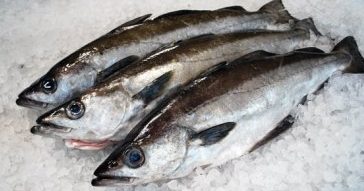 It might not be time yet to rechristen Cape Cod as Cape Pollock, but the humble fish is staking its claim. The Atlantic pollock has long played a role in New England’s fishing industry as a cheaper alternative to cod and haddock, but the fish’s place in America’s oldest fishing industry is expanding as stocks like cod fade. But the fish has an image problem. While considered a whitefish, its uncooked gray-pinkish color looks drab compared to the snow-white cod fillets consumers are used to seeing on seafood counters. And many confuse it with the very different Alaska pollock, which is the subject of a much larger industrial fishery that provides fish for processed food products such as the McDonald’s Filet-O-Fish. Read the rest here 12:27
It might not be time yet to rechristen Cape Cod as Cape Pollock, but the humble fish is staking its claim. The Atlantic pollock has long played a role in New England’s fishing industry as a cheaper alternative to cod and haddock, but the fish’s place in America’s oldest fishing industry is expanding as stocks like cod fade. But the fish has an image problem. While considered a whitefish, its uncooked gray-pinkish color looks drab compared to the snow-white cod fillets consumers are used to seeing on seafood counters. And many confuse it with the very different Alaska pollock, which is the subject of a much larger industrial fishery that provides fish for processed food products such as the McDonald’s Filet-O-Fish. Read the rest here 12:27
Mother’s Day is extra special for this boat building team
 Joyce and Anita Cottreau spend every day working side by side on the floor of the bustling Wedgeport Boats yard in southwest Nova Scotia. A female fibreglass team is a rarity in itself, but this duo is also mother and daughter. “Working together has brought us closer together,” Joyce, 59, said. The two plan to spend Mother’s Day together, which they say will be no less special for being workmates. “Mom has always been there for me, even though she has worked full time since I was a baby,” Anita said. “Anything I needed or wanted, she’s bent over backwards for me, so I definitely have to appreciate that — and still do.” Video, read the rest here 10:08
Joyce and Anita Cottreau spend every day working side by side on the floor of the bustling Wedgeport Boats yard in southwest Nova Scotia. A female fibreglass team is a rarity in itself, but this duo is also mother and daughter. “Working together has brought us closer together,” Joyce, 59, said. The two plan to spend Mother’s Day together, which they say will be no less special for being workmates. “Mom has always been there for me, even though she has worked full time since I was a baby,” Anita said. “Anything I needed or wanted, she’s bent over backwards for me, so I definitely have to appreciate that — and still do.” Video, read the rest here 10:08








 Using tags surgically implanted into thousands of juvenile salmon, UBC researchers have discovered that many fish die within the first few days of migration from their birthplace to the ocean. “We knew that on average 10 to 40 million smolts leave Chilko Lake every year and only about 1.5 million return as adults two years later,” said Nathan Furey, researcher and a PhD candidate in the faculty of forestry. “It’s always been a mystery about what happens in between.” More than 2,000 salmon were tracked over four years and researchers found that survival was poor in the clear and slow-moving Chilko River, where predators were feeding intensely on the smolts. Once in the murky and fast-flowing Fraser River, the salmon travelled day and night, covering up to 220 km per day, and experienced nearly 100 per cent survival. The researchers believe that in these waters, predators have difficulty finding and getting to the fish.
Using tags surgically implanted into thousands of juvenile salmon, UBC researchers have discovered that many fish die within the first few days of migration from their birthplace to the ocean. “We knew that on average 10 to 40 million smolts leave Chilko Lake every year and only about 1.5 million return as adults two years later,” said Nathan Furey, researcher and a PhD candidate in the faculty of forestry. “It’s always been a mystery about what happens in between.” More than 2,000 salmon were tracked over four years and researchers found that survival was poor in the clear and slow-moving Chilko River, where predators were feeding intensely on the smolts. Once in the murky and fast-flowing Fraser River, the salmon travelled day and night, covering up to 220 km per day, and experienced nearly 100 per cent survival. The researchers believe that in these waters, predators have difficulty finding and getting to the fish. 


























